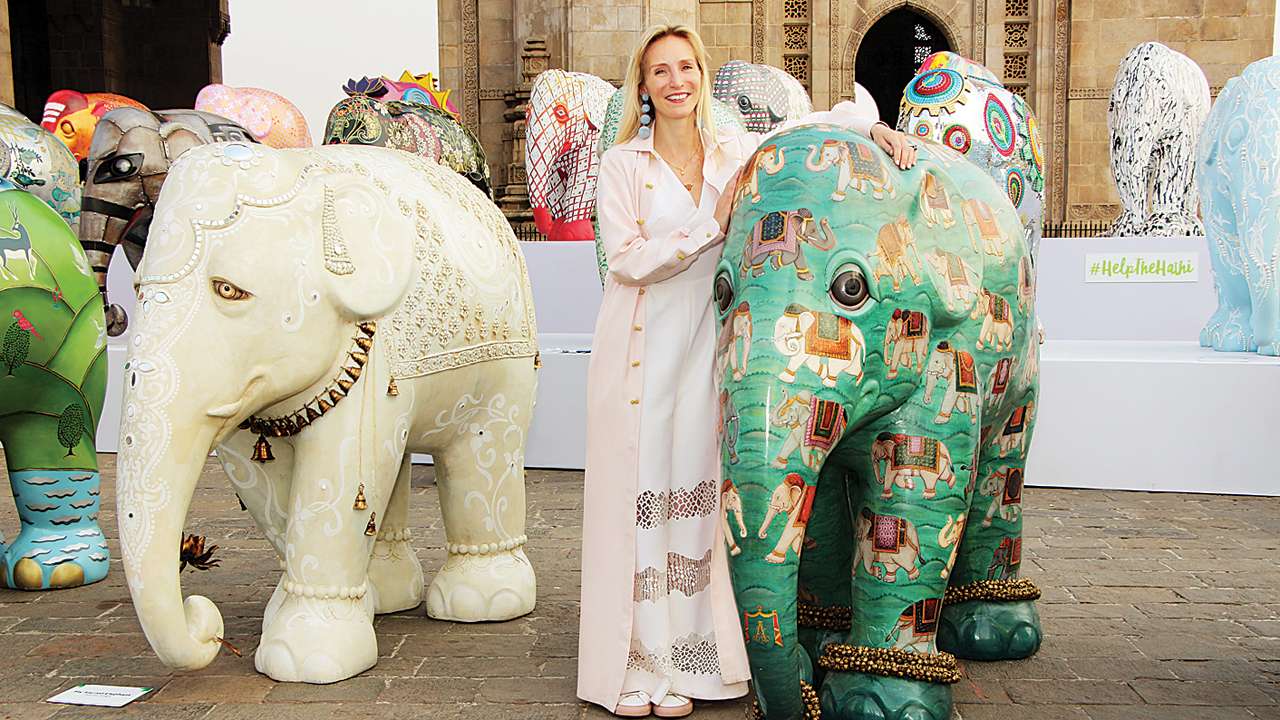
Vivacious at 39, Ruth Ganesh is the reason why no one gained a stiff upper lip at the recent opening of the Elephant Parade in Mumbai by the London-based Asian charity, Elephant Family (EF) that she is the CEO of. The event involves the 'parading' of 101 fibreglass baby elephants, each made artistic by the likes of Christian Louboutin, Shah Rukh Khan, His Highness Maharaja Sawai Padmanabh Singh Ji, Rohit Bal, contemporary artists, and tribal and local artisans, at Mumbai's prominent open spaces for the public to canoodle with. And like the previous EP editions — this one being the 25th and India's first — the sculptures, up for bids on the auction site Paddle8, will see all proceeds go towards the conservation of Asian elephants whose numbers have dwindled by 90 per cent over the last century to unfortunately win a spot on the Red List of Threatened Species. Globally, with just 50,000 alive, 27,000 of them being in India, the 101 displayed pachyderms represent the 101 elephant corridors as identified by Wild Trust of India (WTI).
While art practitioners are tsk-tsking the positioning of these art objects in a city that has a poor repute with public art, Ganesh actually wants the locals to hug, snuggle up to, take selfies with and mount the man-made mammals. "There's so much art for art's sake in the galleries with it all being 'don't ask what it means, darling', and I'm like 'screw that!'" She continues, "We're in the city of Ganpati. So in whatever the condition the elephants end up in (after the public display), we'll restore it."
EP, which has the Prince of Wales and the Duchess of Cornwall as joint presidents, was founded by the latter's late brother and conservationist Mark Shand. And Ganesh, who happens to be Shand's protege and ex lover, has been a part of the organisation for 15 years now. Along with the parade, planning edgy charity events like the annual animal masquerade ball in London or a donor convoy on kitschy chagdas, jeeps and Enfield bikes across Rajasthan to spread awareness about conserving the gentle giants, is all Ganesh's brainwork.
The EF, Ganesh clarifies, only focuses on the Asian elephant across six Asian countries. "We only look after the wild ones because it's the economics of saving 100 elephants versus looking after a herd of 5,000 at the Western ghats... Like Picasso said, 'The elephant is evidence that God is an artist'. When you save an elephant, you save a forest and everything in it." However, the lines between those captive and in the wild converge at times. EF is involved in investigating the trafficking of baby elephants from Thailand and Myanmar forests, who are trained under torture to entertain tourists. "We now campaign for DNA testing and registration before the elephant turns a year old," says Ganesh. To stay put on all fours, EF has an inbuilt newsfeed that collects every mention of the Asian elephant in every newspaper across the continent. "We've found that the dominant problem in Asia is loss of habitat. Elephants are harangued when they eat crops. They are run over by trains (or sometimes they derail trains). Some are also put on birth control pills to stop procreation," informs Ganesh. The most ghastly is where an elephant, foraging for leaves with its trunk, hits an overhead electric wire running through forests, and gets electrocuted. The tragedy doesn't stop here as often the whole herd rushes to save their own only to end up meeting the same fate. Ganesh muses, "You know, they (the elephants) could just kill us all as they are at a war with development. But when I look at them, they just blink back, with such an understanding behind those eyes."
Memories of her travels to identify problem areas or ensure the funds are well-ultilised remain vivid. She recalls how an entire herd gathered around the one her team radio-collared in Borneo, a few leaning on it as if to comfort it.
"That emotional bond is present in all species, but more obvious in elephants." Eight years ago, an entire village in Wayanad, Kerala, agreed to move a couple of kilometres away from an elephant corridor. "Those people had family members killed and crops destroyed by the elephant, and yet they were full of compassion for the animal. And look at us (urban folks). We still drink with a (plastic) straw."
Ganesh either dreams about elephants or receives 'white elephants' — themed gifts from well-meaning folks who assume she needs more of the land's largest mammal in her life. In what was a beautifully accidental move by the universe, she fell in love and married an Indian — Ganesh Ramani, a partner in Goldman Sachs, who donates his entire salary to conservation. The surname 'Powys' was replaced with that of the elephant god. "I surprised him with five elephants at the wedding [last year]", says Ganesh. Reminder of the event is a dainty, elephant pendant dangles from her neck, a gift from the in-laws. For Ganesh, clearly there's no escaping the elephant.